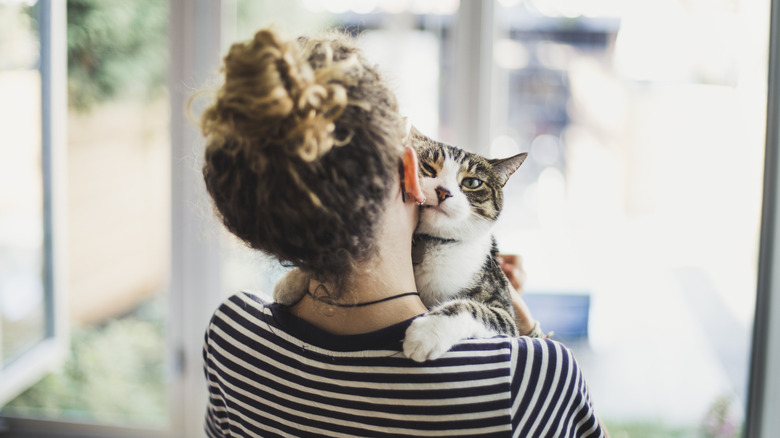Do Cats And Dogs Provide Different Health Benefits? Here's What We Know
Some people are "dog people" and prefer the loyalty and attention that these pets provide. Others are "cat people" and would rather have a less needy, more independent companion. Some people love both species. These pets can change a person's life in a positive way, so it's no wonder they're the two most popular pets in American households. In fact, cats provide many of the same health benefits for humans that dogs do, while some species-specific benefits exist as well.
You don't have to own a dog or cat to know that they can bring joy to a home. After all, how many times have you smiled at an adorable pet photo or real-life puppy or kitten? How many times have you laughed at a video of a dog or cat doing something silly on social media? Of course, not every aspect of pet ownership is smiles and laughs, but the health benefits for most loving pet owners far outweigh the disadvantages.
Dogs and cats can promote exercise
Assuming you have every intention of being a responsible, caring dog owner, you'll need to devote time to your pet's mental and physical health. This means playing fetch or tug-of-war with them and/or taking them for walks or runs. You can also consider some dog-friendly outdoor activities beyond your morning walk to keep them active, healthy, and mentally stimulated, such as swimming and agility training.
You may not always be in the mood to get outside or throw a toy around, but thinking of your dog's needs and the joy of their companionship can encourage you to get active. In fact, people who own dogs are more likely to get the recommended amount of exercise every week than people who don't. Exercising on a regular basis can help you manage your weight, lowering your risk of obesity, diabetes, and other diseases. It's also great for your bones and muscles, and it can improve your skin health and sleep quality.
Cats, despite not being as active as their canine counterparts, can also promote exercise for you and anyone else in your home. Taking your cat for a leashed walk might be an option, but if your kitty flat out refuses to be walked, you can train them to ride around in an enclosed cat stroller instead. You can also place them in a bike trailer made for pets and ride around with them behind you, or place them in a pet backpack during a hike.
Dogs and cats can prevent allergies and asthma
Many people develop allergies or asthma at a young age, but it's possible to develop both conditions later in life. Sharing your home with a dog or cat can lower these risks for you and anyone else you live with, especially children. An Allergy, Asthma & Immunology Research study found that approximately 10-20% of people in the world are allergic to dogs or cats. However, a 2007 Allergy and Asthma report showed exposure to these pets at a young age can actually prevent allergies from developing. Exposure and therapy may also lower the risk of allergy development in adults as well.
Asthma is a respiratory problem that affects people of all ages. More than 262 million people in the world have asthma, but research shows that dogs and cats can help prevent this condition as well. The National Institutes of Health published a study in 2017 with the claim that children who are exposed to pet allergens are less likely to develop asthma later.
Dogs and cats can benefit your mental health
Although it doesn't always get the same recognition, mental health bears the same high level of importance as physical health. A person's mental health involves their emotions, mood, and thoughts, including stress. Stress is a feeling that we all experience at some point, but research shows that interacting with dogs, cats, and other mammals can reduce stress levels. A 2019 study by the American Educational Research Association found that petting a dog or cat for 10 minutes lowered the stress hormone cortisol in their saliva.
Depression is another component of mental health that many people experience all over the world, and yes, pets can help with the management of this disorder, too. Depression is commonly characterized by feelings of sadness and a loss of interest in previously enjoyable activities. These feelings can then lead to loneliness, which can sometimes be overwhelming.
Owning a pet can have several benefits for mental health, including providing distraction, giving a sense of identity, and alleviating worries. By forcing pet parents into a routine, they can help provide order and continuity, as well as meaning.
A cat's purrs can promote healing and calmness
Cats and dogs share many of the same characteristics, but one attribute about cats that you won't find in dogs is their ability to purr. What does it mean when a cat purrs? The vibratory, soothing sound of a purr serves as a key indicator of a feline's comfort and contentment. Cats purr while they're catching some Zzzs or just relaxing, when someone pets them, or when they're hungry, among other reasons. Most people would consider the sound a pleasant one, but purrs can do more than just trigger a smile.
A cat's purr can also help people heal, too. Gary Weitzman, a San Diego-based veterinarian and the CEO of the San Diego Humane Society, shared his thoughts on the topic with BBC. "Purrs at a frequency of 25-100Hz correspond with established healing frequencies in therapeutic medicine for humans," he said. For healing, bone responds to 25-50Hz, while skin and soft tissues around 100Hz. In addition, purring also creates a calming effect in humans.
Dogs can improve your sleep quality if you live alone
"Should I let my dog sleep in my bed with me?" is a question that will forever be debated among pet owners, and you'll find sound reasoning on both sides. The people who think dogs should not be allowed in their owners' beds tend to focus on the sanitary concerns or the possible disruptiveness caused by a dog's frequent movements. Those on the other side of the spectrum focus on the benefits, especially the ones for people who live alone.
One benefit to co-sleeping with your dog that's been scientifically proven is the improvement of overall sleep quality. Many people who live alone experience what's referred to as somniphobia, or the fear of sleeping alone. This fear can make it difficult to fall asleep and even result in mood swings throughout the day.
Dogs to the rescue! A survey revealed that people who let their dogs sleep in the bed with them felt a high level of comfort and security. In addition, cat owners who shared their bed with their cats felt more secure than not having anyone in bed at all, to a lesser extent. Despite any differences, the added health benefits of owning a dog or cat can be great for your mental and physical health.





